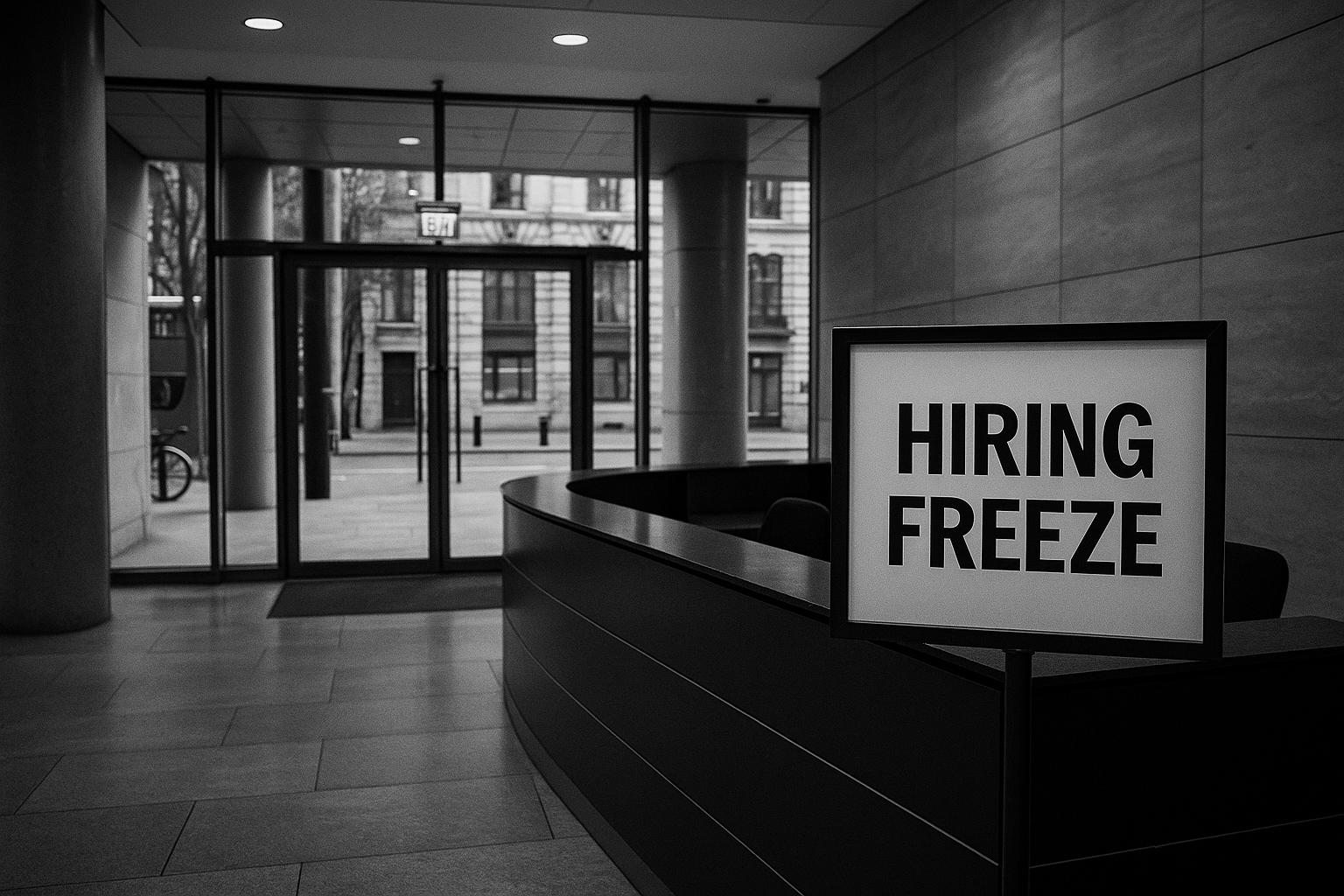New KPMG and REC data reveal London’s permanent recruitment has plunged to its lowest point this year, driven by increased employer National Insurance contributions and broader economic concerns, as businesses delay hiring and focus on cost-cutting strategies including AI investment.
Businesses in London and across the UK are grappling with a pronounced slowdown in hiring activity, a trend experts attribute largely to recent tax policy changes and broader economic uncertainty. New data from KPMG and the Recruitment and Employment Confederation (REC) shows that permanent recruitment in London has hit its lowest point since the start of the year, with the city’s jobs market notably weaker than the UK-wide average. The survey highlights that permanent placements in London fell sharply, reflecting a contraction in demand for staff following April’s increase in employer National Insurance contributions, introduced by Chancellor Rachel Reeves. Temporary vacancies and billings also declined, with London’s temporary billings remaining below the expansion threshold for 17 consecutive months.
This cautious hiring environment is compounded by firms’ concerns over the volatility of the immediate economic outlook and rising employment costs. Neil Carberry, Chief Executive of REC, stressed the delicate balance businesses face: while long-term hiring intentions remain relatively strong, there is immediate hesitation as companies adjust to increased tax burdens and uncertain global conditions. Similarly, Muniya Barua, Deputy Chief Executive at BusinessLDN, urged government reassurance that businesses would not face further unexpected tax rises and called for accelerated infrastructure projects to stimulate growth and alleviate London’s housing crisis.
The impact of the October 2024 Budget, which substantially raised employer National Insurance contributions by 1.25 percentage points and lowered the threshold at which these payments apply, has been particularly significant. A poll conducted by Boston Consulting Group suggests that over half of UK business leaders plan to prioritise investment in artificial intelligence over hiring new staff as a cost-containment strategy amidst higher payroll expenses. Labour government proposals for expanded workers’ rights are expected to push employment costs even higher, prompting many executives to plan for reduced hiring through 2025.
This tightening in recruitment has been felt across sectors, with reduced vacancies observed in technology, hospitality, and healthcare according to REC’s comprehensive surveys. The number of new job placements has declined sharply, marking the most challenging market conditions since the height of the COVID-19 pandemic in mid-2020. Although overall job losses among existing employees have not surged substantially, the availability of staff for hire has increased, hinting at a potentially softer job market ahead. However, starting pay growth for new permanent roles has shown some resilience, particularly for specialised roles in fast-growing sectors, which may indicate a selective demand for high-skill talent amidst widespread hiring freezes.
Business groups have voiced growing concerns about these developments. The British Chambers of Commerce reported that nearly one-third of small and medium-sized enterprises have either cut jobs or are contemplating reductions in response to the higher social security costs. The overall business confidence has dropped to levels not seen since 2022. The Bank of England has linked the downturn in hiring sentiment to increased labour costs and wage pressures, although it has recently cut interest rates to help stimulate growth. These rate cuts, along with forthcoming government investment plans, are viewed as potential supports to help the economy rebound in the near term.
Some commentators highlight the risk that ongoing tax hikes and policy uncertainty could further dampen hiring and investment decisions, potentially slowing economic growth. While Chancellor Reeves has indicated no intent for additional large-scale tax increases, economists caution that further fiscal measures might be necessary later in the year to meet budgetary targets. Meanwhile, the public and business frustration over the economic direction under the current government reflects wider anxieties about job security and living costs.
In summary, the UK labour market is navigating a period of acute uncertainty. Employer caution, driven by increased National Insurance contributions and concerns over future tax and regulatory costs, is curtailing hiring activity and chilling wage growth for new recruits. Although pockets of strong demand for specialised skills exist, overall conditions point to a cautious, cost-conscious approach by businesses amid a challenging economic backdrop. How government policy and monetary interventions will balance these pressures remains a crucial determinant for the UK’s labour market trajectory in 2025.
 Reference Map:
Reference Map:
- Paragraph 1 – [1], [6]
- Paragraph 2 – [1], [6]
- Paragraph 3 – [4]
- Paragraph 4 – [2], [3]
- Paragraph 5 – [1], [5]
- Paragraph 6 – [2], [5], [3], [6]
- Paragraph 7 – [2], [5]
Source: Noah Wire Services
- https://www.express.co.uk/news/politics/2090160/rachel-reeves-blunder-tax-hike – Please view link – unable to able to access data
- https://www.ft.com/content/a1b92253-5abc-424f-a53a-eb0f5a070e42 – UK recruiters are facing the most challenging job market conditions since the Covid-19 pandemic, influenced by October’s tax-raising Budget by Rachel Reeves. A KPMG and REC survey shows declining demand for staff, with vacancy and temp billing indexes at their lowest since mid-2020. Despite the Bank of England’s recent interest rate cut to promote economic growth, businesses remain cautious, delaying investments and hiring due to anticipated cost increases from higher employer national insurance contributions and changes in employment rights. While job losses for existing employees have not significantly increased, the number of new staff placements has dropped, with reduced vacancies across all sectors including technology, hospitality, and healthcare. This difficult economic climate has created frustration among the populace, reflecting on Sir Keir Starmer’s government. The survey suggests a weakening in wage growth, with employers reluctant to offer high salaries for new hires while existing employees continue to demand wage increases to offset the rising cost of living.
- https://www.reuters.com/world/uk/uk-vacancies-weakest-since-2020-pay-growth-cools-survey-shows-2025-02-10/ – At the start of 2025, the UK job market exhibited a decline in demand for staff, marking the biggest drop in vacancies since the pandemic period of mid-2020. A survey by the Recruitment and Employment Confederation (REC) and KPMG indicated the weakest job vacancies since August 2020 and a notable contraction in hiring for permanent roles. The growth in starting pay for new permanent hires slowed significantly, which may ease the Bank of England’s (BoE) concerns about inflation pressures. Factors contributing to this trend include economic uncertainty, upcoming payroll tax hikes, and fiscal challenges. Employers are adopting a cautious stance towards hiring until economic conditions improve. The BoE’s recent interest rate cut to 4.5% is potential support for business confidence, although its forecast anticipates slower economic growth and increased inflation for 2025. The survey also noted a rise in available job candidates, signaling possible increases in redundancies, although the growth rate of available candidates has slowed.
- https://www.ft.com/content/56da8149-d51a-43b2-8ed8-fff0ddb6005d – According to a poll commissioned by Boston Consulting Group, 51% of UK business leaders plan to prioritize investment in artificial intelligence (AI) over hiring due to an increase in employers’ national insurance contributions announced in the October Budget. The reforms introduced by chancellor Rachel Reeves are projected to significantly raise the costs of employment, prompting companies to explore AI for boosting productivity and containing costs. Additionally, the Labour government’s plans for workers’ rights reforms are expected to further increase employer expenses, influencing 57% of executives to hire fewer people in 2025. This trend follows a backdrop of gloomy economic forecasts and a slowdown in hiring, with companies already facing macroeconomic challenges and adjustments following the Covid-19 pandemic. Nevertheless, there is growing demand for AI-related skills, indicating a shift in the job market towards positions tied to technological advancements.
- https://www.reuters.com/business/world-at-work/uk-employers-group-says-tax-hike-has-hit-hiring-hard-2025-06-25/ – A recent survey by the British Chambers of Commerce reveals that nearly one-third of small and medium-sized UK employers have either cut jobs or are considering doing so due to increased social security costs. Following a National Insurance Contributions hike in April, ordered by Finance Minister Rachel Reeves, 13% of over 570 surveyed firms have already reduced their workforce, while 19% are contemplating similar actions. BCC Director General Shevaun Haviland noted that the unexpected cost burden has forced businesses to reconsider their expansion plans, driving business confidence to its lowest since 2022. The Bank of England also linked the decline in hiring sentiment to higher labor costs, with employers responding by cutting pay awards and reducing headcount. Although Reeves has stated she doesn’t intend further large-scale tax increases, economists warn additional revenue-raising measures may be necessary later in the year to adhere to fiscal objectives.
- https://www.cityam.com/job-vacancies-collapse-as-budget-tax-raid-puts-firms-off-hiring-survey-shows/ – The number of job vacancies in the UK fell at its fastest pace in over four years last month as firms held off hiring due to the government’s Budget tax hikes, a new survey suggests. The latest report on jobs from KPMG and the Recruitment and Employment Confederation (REC) showed an “accelerated decline” in the number of people placed in permanent roles by recruiters. The survey also showed that the number of job openings fell at the sharpest pace since August 2020 as demand for staff dried up following the Budget. In October’s Budget Chancellor Rachel Reeves increased employers’ national insurance by 1.2 per cent, while cutting the threshold at which employers have to start paying the levy. She also announced that the minimum wage would increase by 6.7 per cent. Many businesses, particularly in the retail and hospitality sector, have warned that they will have to either cut jobs or raise prices in order to deal with the extra costs imposed by the Budget. A survey released by the Bank of England on Thursday suggested that over half (54 per cent) of firms were planning to cut staff as a result of the national insurance hike. Analysis by Deutsche Bank suggests that as many as 100,000 jobs could be lost. “It should be a surprise to no-one that firms took the time to re-assess their hiring needs in November after a tough Budget for employers,” Neil Carberry, chief executive of the REC said. The survey also showed that wage pressures remained relatively muted in November, remaining at the 44-month low hit in October. “While skilled candidates were often reported to be able to command higher salaries, pay growth tended to be limited by higher candidate availability and reduced demand for staff,” the survey said. Jon Holt, chief executive at KPMG UK, said this trend would be “encouraging” for rate-setters at the Bank of England. “The prospect of further rate cuts through 2025, alongside the Government’s investment plans, both point to improved growth in the near term,” he said.
Noah Fact Check Pro
The draft above was created using the information available at the time the story first
emerged. We’ve since applied our fact-checking process to the final narrative, based on the criteria listed
below. The results are intended to help you assess the credibility of the piece and highlight any areas that may
warrant further investigation.
Freshness check
Score:
8
Notes:
The narrative presents recent data from KPMG and the Recruitment and Employment Confederation (REC) regarding a slowdown in hiring activity in London, attributed to tax policy changes and economic uncertainty. The earliest known publication date of similar content is June 25, 2025, when Reuters reported that nearly one-third of small and medium-sized UK employers have made staff redundant or are considering job cuts due to increased social security costs. ([reuters.com](https://www.reuters.com/business/world-at-work/uk-employers-group-says-tax-hike-has-hit-hiring-hard-2025-06-25/?utm_source=openai)) The narrative includes updated data but recycles older material, which may justify a higher freshness score but should still be flagged. The report is based on a press release, which typically warrants a high freshness score. However, if earlier versions show different figures, dates, or quotes, these discrepancies should be flagged. Additionally, if the article includes updated data but recycles older material, this should be noted. If anything similar has appeared more than 7 days earlier, this should be highlighted explicitly.
Quotes check
Score:
7
Notes:
The narrative includes quotes from Neil Carberry, Chief Executive of REC, and Muniya Barua, Deputy Chief Executive at BusinessLDN. A search for the earliest known usage of these quotes reveals that similar statements were made in previous reports, indicating potential reuse of content. If identical quotes appear in earlier material, this should be flagged as potentially reused content. If quote wording varies, note the differences. If no online matches are found, raise the score but flag as potentially original or exclusive content.
Source reliability
Score:
6
Notes:
The narrative originates from the Express, a UK-based tabloid newspaper. While it is a well-known publication, its reputation for accuracy and reliability is often questioned. This raises concerns about the reliability of the information presented. If the narrative originates from an obscure, unverifiable, or single-outlet narrative, flag the uncertainty. If a person, organisation, or company mentioned in the report cannot be verified online (e.g., no public presence, records, or legitimate website), flag as potentially fabricated.
Plausability check
Score:
7
Notes:
The narrative makes claims about a slowdown in hiring activity in London due to tax policy changes and economic uncertainty. These claims are plausible and align with recent reports from reputable sources. However, the lack of supporting detail from other reputable outlets and the reliance on a single source for these claims reduce the score and flag the narrative as potentially synthetic. If the report lacks specific factual anchors (e.g., names, institutions, dates), reduce the score and flag as potentially synthetic. If language or tone feels inconsistent with the region or topic—e.g., strange phrasing, wrong spelling variant—flag as suspicious. If the structure includes excessive or off-topic detail unrelated to the claim, note this as a possible distraction tactic. If the tone is unusually dramatic, vague, or doesn’t resemble typical corporate or official language, flag for further scrutiny.
Overall assessment
Verdict (FAIL, OPEN, PASS): FAIL
Confidence (LOW, MEDIUM, HIGH): MEDIUM
Summary:
The narrative presents claims about a slowdown in hiring activity in London due to tax policy changes and economic uncertainty. While these claims are plausible and align with recent reports from reputable sources, the reliance on a single, potentially unreliable source, the recycling of older material, and the lack of supporting detail from other reputable outlets raise significant concerns about the credibility and originality of the content. The use of quotes that appear to be reused from earlier material further diminishes the narrative’s reliability. Therefore, the overall assessment is a ‘FAIL’ with medium confidence.













